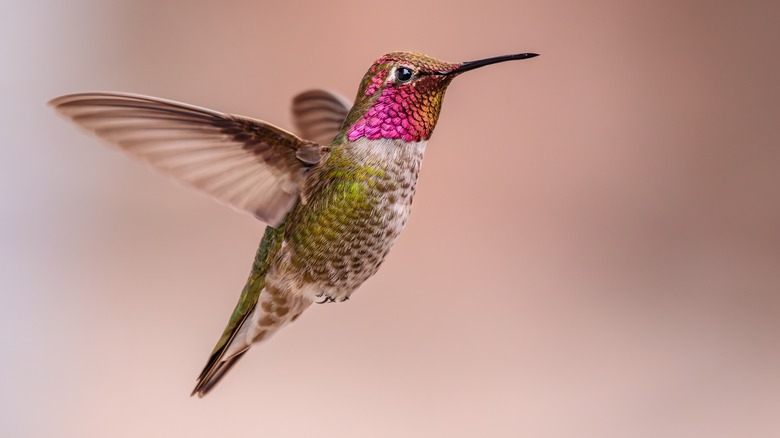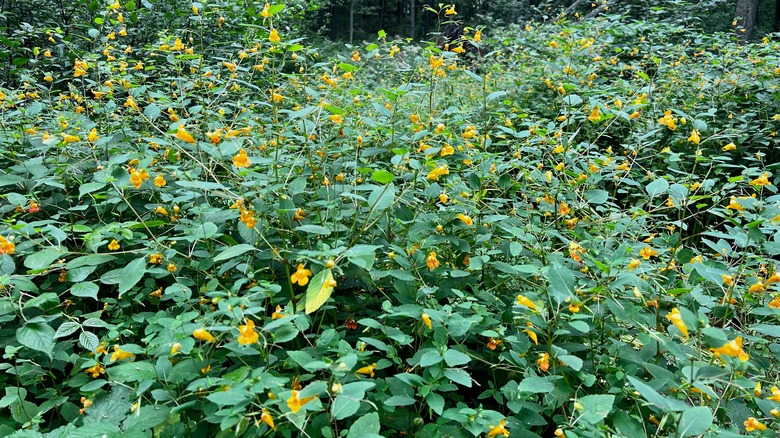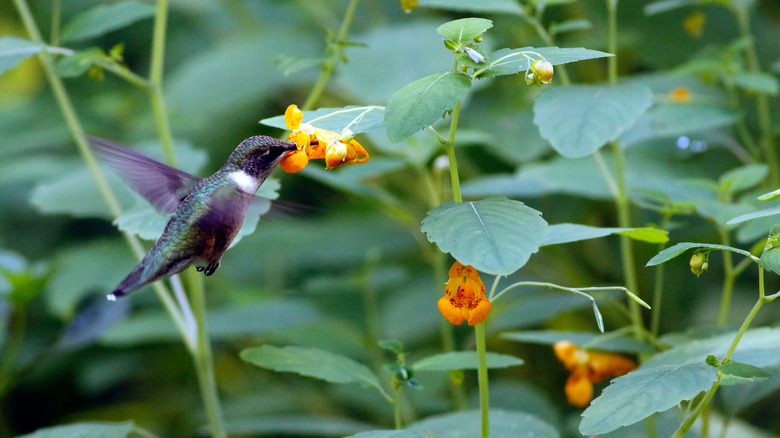Hummingbirds Will Love This Cheery Flowering Plant In Your Container Garden
Feeders can be a good food source to attract hummingbirds to your yard, but flowers are even better — and the birds know it. According to Cornell University's Project FeederWatch, when hummingbirds are faced with a choice between feeders and flowers in one area, they tend to eat organic. Even though the feeder could be a more consistent food source, hummingbirds understand that flowers usually have a higher caloric payoff and more essential nutrients. If you needed yet another reason to grow more plants in your garden, flowers freshly replenish their nectar reservoirs constantly, and they have the added benefit of attracting other important pollinators to your yard. If you're looking for a unique, container-friendly flowers that hummingbirds absolutely love, Jewelweed (Impatiens capensis) is an eye-catching native option that's perfect for container gardens.
Also known as spotted touch-me-not, spotted jewelweed, common jewelweed, or orange jewelweed, this plant has several qualities that make it a magnet for hummingbirds. From its bright colors to the flower shape, jewelweed has evolved tubular hanging flowers to be pollinated by hummingbirds. Here's what you need to know about jewelweed and how you can use it to bring beauty and a buzz of activity to your garden.
Jewelweed is a beautiful buffet for hummingbirds
Jewelweed is a self-seeding annual from the Balsaminaceae family that sprouts up in early spring and generally grows to around 2 to 5 feet tall by August. The plant itself has a delicate, breezy appearance with thin stems and large oval-shaped leaves, and it tends to take up residence along the shaded edges of woodlands, pathways, bogs, and ditches. The plant earns its nickname "spotted touch-me-not" because its seed pods will explode almost violently when touched. Jewelweed's charming flowers appear around mid-summer, displaying bright orange petals with flecks of red. These flowers will never "open up" completely, requiring bees and other insect pollinators to crawl into the funnel-like blooms. However, hummingbirds have no trouble accessing the plant's sweet nectar with their long beaks and tongues!
There are many reasons why jewelweed is a brilliant pick if you want more hummingbirds in your backyard. For one, hummingbirds will visit a wide variety of flowers, but tubular flowers tend to be the most attractive overall. The blooms' bright pops of red and orange are the perfect color you should add to the garden to help attract hummingbirds, but its attractive blooms aren't just a false advertisement to lure in pollinators. This flower also delivers in terms of nutrients. According to the Georgia Department of Natural Resources, jewelweed nectar contains about 43% sugar — a very high sugar content compared to most other flowers, which usually offer around 20% to 23% sugar.
How to grow and maintain jewelweed
Jewelweed will thrive almost anywhere in USDA zones 2 through 9, is very easy to start from seed, and is an extremely low-maintenance plant once established. It prefers moist, partially shaded areas, but can survive in the sun as long as summers are mild. Have a favorite pretty planter that lacks good drainage? Jewelweed is perfect because it tolerates soggy soil! Jewelweed is also great in containers because it enables the gardener to move the plant as needed, ensuring adequate shade and ease of watering on especially hot, dry summer days. To help the soil retain moisture, consider adding a thin layer of mulch on top of your potting soil after adding seeds to the pot. Remember to collect and replant the seeds in late fall to allow for a return in spring.
Unfortunately, this plant is not super common to find at typical garden retailers, but you may be lucky enough to find jewelweed at a dedicated native plant nursery or online. Many people believe that "thrillers, fillers, and spillers" is the best formula you should use when designing a container garden, but jewelweed should have its own dedicated space because it can be fast-growing and competitive. Although it is native to northern and eastern portions of North America, jewelweed is considered invasive in some areas, including Vermont, Connecticut and Washington state. Container gardening is wise to prevent jewelweed from spreading unchecked where it's not desired.


